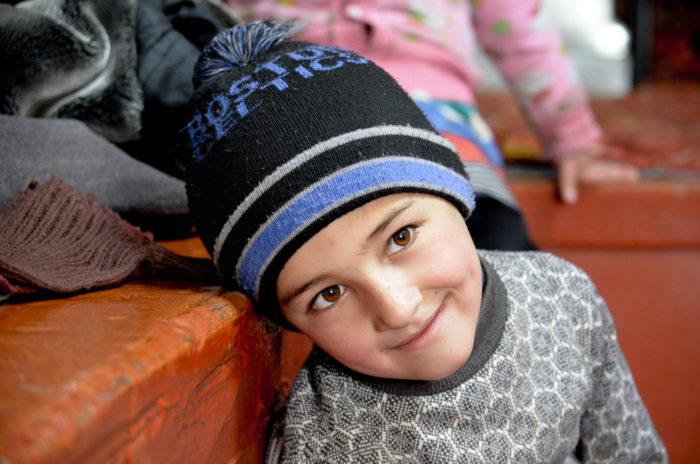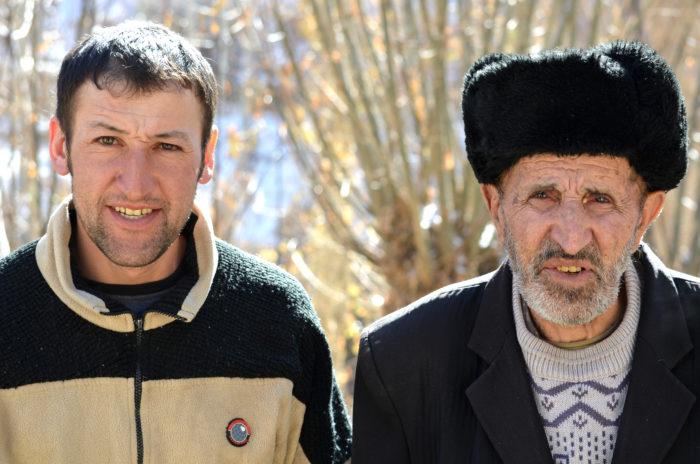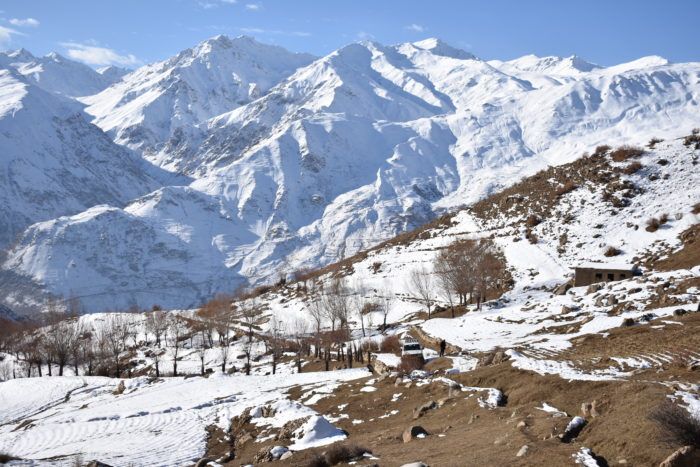Aga Khan Foundation (AKF) launched a five-year program of agricultural development and nutrition support in the remote mountains of Afghanistan, Pakistan, and Tajikistan entitled Mountain Food and Nutrition Security (MFNS). The program aims to improve the food and nutrition security of marginalized pastoral communities in high mountain villages with fragile farming systems. This story illustrates MFNS’s commitment to working with the most vulnerable households.
Food Insecurity and the Most Vulnerable
Tajikistan is an agrarian country of nearly nine million people, where three-quarters of the people live in rural areas. Agriculture accounts for 60 percent of employment, but farming in these rugged mountains is hard. Tajikistan has the highest rate of malnutrition among all 15 former Soviet republics. Recurrent natural disasters such as landslides expose low-income families to chronic food insecurity. Vast stretches of farmland are degraded by widespread deforestation, soil erosion, and drought.
Nearly one in three young children in the mountain communities of Gorno-Badakhshan Autonomous Region (GBAO), the most isolated region, experience moderate or severe stunting. Stunting is caused by poor hygiene, inadequate knowledge and education, poor health services, and household food insecurity. Against this backdrop, the MFNS program addresses immediate and long-term food security needs of communities in GBAO.

Ensuring No One is Left Behind
Globally, progress on breaking the poverty cycle is slowest for the poorest of the poor. There are many challenges to reach the most vulnerable, who often live in environments with poor infrastructure, low population density, and minimal economic opportunities. These factors make for a more difficult work environment, and reflect a greater need for assistance.
AKF and community organizations jointly conducted a participatory assessment to identify the poorest and most vulnerable households. MFNS reaches the total population and in addition, assists the 336 poorest households with tailored project support, recognizing that food insecurity and ultra-poverty are tightly connected. Free provisions to poorest households included potato seeds, wheat seeds, and fertilizers. The project also distributed sprinkles containing micronutrients to the poorest households with young children aged 6 to 24 months to prevent childhood nutrition deficiencies.
Helping the Most Vulnerable
In Sejd, a remote village in the mountains of GBAO, three generations live together under the same roof. Gulrukh, a 39-year-old father of five, shares a house with his parents, wife, sister, niece, and children. Traditionally, the youngest son stays behind to take care of his parents as they grow older. This has proven to be particularly challenging for Gulrukh and his wife Gulston due to the lack of job opportunities locally and his father’s poor health. Akbarsho is 80 years old and for three years has endured a tumor that requires him to use a catheter that often needs to be changed and replaced.

“I am the only man of the house—I need to stay here to take care of him,” says Gulrukh. “There are always issues with his tube so I need to be here to fix it.”
Gulrukh’s mother, Azizbegim, is nearly 72 and cannot hear properly nor move around without assistance. The children are all of school age, except for the youngest daughter, who attends an early childhood development center (kindergarten). Her parents fear they will soon no longer be able to afford the kindergarten fees. Their main food staple is potatoes, which the family eats in small quantities every day.
The children are at critical growth stages but the family is often forced to make a meal with only tea with milk, salt, butter, and occasionally bread. They have no source of income apart from the grandparents’ monthly pension of $50. MFNS identified theirs as a most vulnerable household for support.
Tailored Support
Scarce access to local varieties of vegetable seeds and fertilizers is a primary cause of low productivity and malnutrition in GBAO. With support from the MFNS project, village organizations receive seeds and fertilizers as requested by farmers, distributed on a contractual basis. Farmers repay the seeds in-kind or in-cash. They repay the fertilizer provided in-cash with 10% interest. As a most vulnerable household, Gulrukh and his family were one of 200 households to receive 100 kg of potato seeds and fertilizer with no repayment required.
To encourage a healthier and diverse diet, the family also received kidney beans, beetroot, and carrot seeds. Shortages during the lean season are also a key reason why households face severe food insecurity.
“Winter is very difficult. We have to barter for wood to heat the house. My children go to school, but I can’t buy warm clothes for them. We struggle to find enough food.”

MFNS provided Gulrukh and his family, along with 140 other most vulnerable households, with locally produced nutritious food items for the lean season including dried mulberry, apricot, apple juice, fruit jams, beans, potato, cabbage, and nuts. Still, increased agricultural production alone cannot meet the family’s need for varied and quality foods to address nutritional deficiencies. To increase awareness of nutritious food preparation with locally available products, Gulston attended four nutrition education trainings. The family received a recipe book, consultation cards, and DVDs containing information on nutritional issues. They participated in community discussions around common reasons for not consuming nutritious food, food hygiene and safety, and child growth and development. By planting the donated potato seeds, the family managed to harvest a 300 kg yield, enabling them to increase their daily intake and store 100 kg to save for next year’s cultivation.
Work to Be Done
A primary reason that most vulnerable populations often get left behind in development programs is that complex factors combine to make their progress slower and incremental. Gulrukh and his family have expressed sincere gratitude for the program’s support. However, it is clear that their hardships have not disappeared, nor will they for some time.
Gulston has new enthusiasm to cook healthy, nutritious food, but she knows this is limited to the lean season when her family receives food support. To meet an immediate need, the family were forced to eat half of the potato seeds they were provided, resulting in a lower yield than expected. Without any source of income or job opportunities, the family remains vulnerable and reliant on their environment.
Beyond this program, these communities require complementary investments in improving access to services such as water and sanitation, health, and education to achieve lasting food security and broader poverty alleviation. The participatory assessment done with AKF and the community organizations helps to focus this action for change.